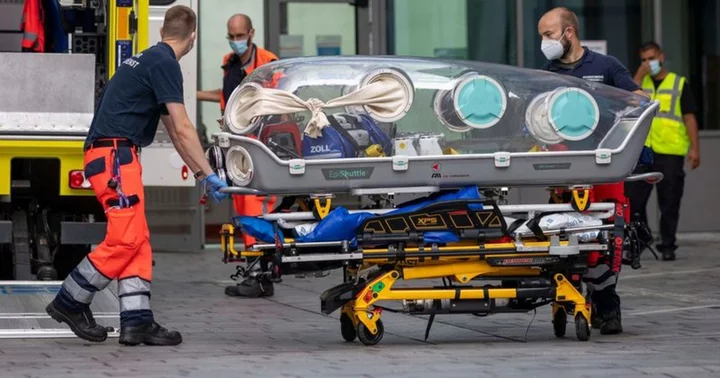PHOENIX, ARIZONA: The Banner Medical Center Poison Center in Phoenix has reported an increase in carbon monoxide poisoning cases, with nearly 50 calls received since October 1.
The Banner Poison and Drug Information Center is urging the public to ensure that carbon monoxide and fire alarms are in working order and to maintain proper hygiene during holiday meal preparation.
Officials warn against carbon monoxide poisoning
With the holiday season approaching and an expected influx of relatives and guests, there is a heightened risk of accidents with potentially severe consequences.
Health officials are emphasizing the importance of securing medications, including proper storage and disposal, particularly in the presence of young children.
As per AZ Family News, they are also cautioning about the potential dangers of festive alcoholic beverages to young children.
“It’s one of those things you can’t really see it, smell it or taste it. That’s why the carbon monoxide detectors are so important. That’s one of the things we want people to do, is make sure they’re working this time of year for sure," it was further reported.
Addressing concerns about smoking and vaping risks is crucial, as children may be at risk of ingesting harmful substances that can lead to serious health issues.
The advisory also includes potential hazards associated with poisonous plants such as poinsettias and mistletoe, which have been known to cause illness in both children and pets.
Batteries in numerous toys, decorations, and devices pose a potential ingestion risk for young children.
Authorities advise parents and caregivers to stay vigilant, ensuring children steer clear of playing with or removing these easily ingestible button-style batteries. U.S. poison centers document around 3,500 instances of battery ingestion annually.
What is the most common cause of carbon monoxide in a home?
As per NHS, the primary culprits behind the accumulation of carbon monoxide are improperly installed, inadequately maintained, or poorly ventilated appliances, such as stoves and hot water heaters.
Additionally, the risk extends to poorly ventilated fireplaces and other gas- or wood-burning devices.
Avoid covering the bottom of natural gas or propane ovens with aluminum foil, as it can impede airflow and lead to carbon monoxide buildup.
Never allow a car or truck to run in a garage, and exercise caution with remote start features to prevent accidental activation.
Indoor use of charcoal grills, oil lanterns, or portable camping stoves is strictly discouraged.
The same applies to portable generators or gas-powered engines; these should only be operated outdoors, maintaining a distance of over 20 feet from open doors or windows.
For safe generator usage, refer to additional tips on proper handling.
Never resort to using a stove or clothes dryer for home heating purposes.
Prior to utilizing a fireplace, ensure that the flue is open.
Following a winter storm, clear snow buildup from vents connected to your dryer, heating system, stove, and fireplace.
Regularly schedule a professional inspection for your heating system to identify and address potential issues.
These precautions collectively contribute to a safer living environment, minimizing the risk of carbon monoxide exposure.
What are the symptoms of CO poisoning?
According to Centres For Disease Control And Prevention, the symptoms of carbon monoxide (CO) poisoning often mimic those of the flu and include headache, dizziness, weakness, upset stomach, vomiting, chest pain, and confusion.
Severe exposure to CO can lead to loss of consciousness or even death. Notably, individuals who are asleep or under the influence of alcohol may succumb to CO poisoning without exhibiting symptoms.
How to prevent carbon monoxide poisoning in your home?
To prevent CO poisoning at home, take the following precautions:
Install a battery-operated or battery back-up CO detector, ideally with a digital readout. Place it strategically, such as outside your bedroom, and replace the detector's battery biannually during daylight saving time adjustments.
Have your heating system, water heater, and any gas, oil, or coal-burning appliances professionally serviced annually by a qualified technician.
Avoid using portable flameless chemical heaters indoors.
If you detect an odor from your gas refrigerator, seek expert servicing, as it may indicate a potential CO leak.
When purchasing gas equipment, choose items with the seal of a reputable national testing agency, like Underwriters’ Laboratories.
Ensure proper venting for gas appliances, with horizontal vent pipes sloping slightly upwards towards the outdoors to prevent CO leaks.
Schedule an annual chimney check or cleaning to prevent blockages that could lead to CO buildup.
Refrain from patching vent pipes with tape, gum, or other materials, as this can contribute to CO accumulation.
Never use a gas range or oven for heating, as it can result in CO buildup.
Avoid burning charcoal indoors, regardless of its color, as it releases CO.
Refrain from using a portable gas camp stove indoors to prevent CO buildup.
Never operate a generator indoors, in the basement, garage, or within 20 feet of windows, doors, or vents.
Use a battery-powered or battery-backup CO detector when using a generator.
Banner–University Medical Center Phoenix's poison and drug information center offers complimentary and confidential services for poison control and medication-related inquiries. Operating 24/7, seven days a week, individuals can contact the hotline at (800) 222-1222 from any location to link up with the nearest poison center









